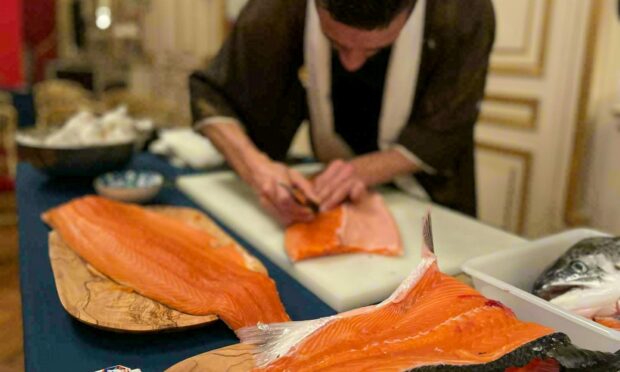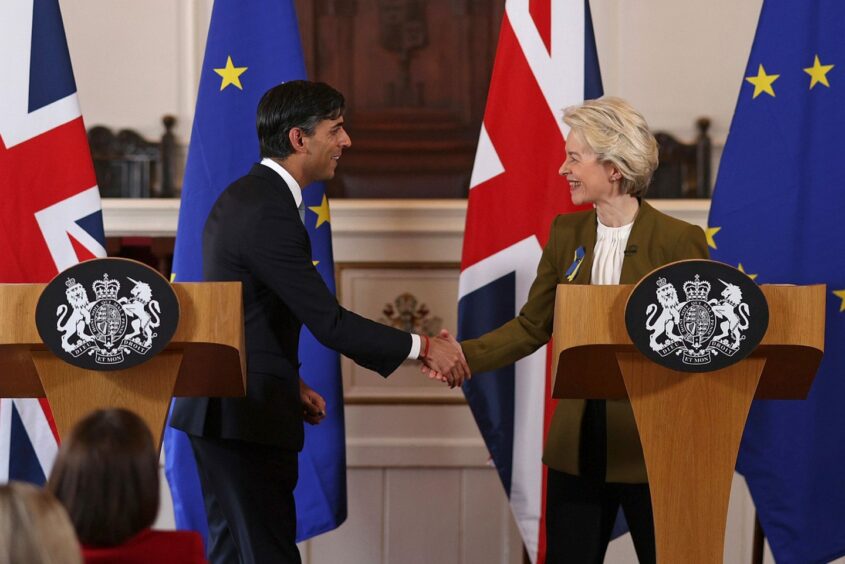As UK Prime Minister Rishi Sunak and European Commission President Ursula von der Leyen announced a “decisive breakthrough” on a post-Brexit deal, Scotland’s salmon farmers welcomed the easing of trade tensions.
The trade body for Scottish salmon farming admitted the UK’s departure from the European Union has proved “challenging” for the sector, which made up one of the UK’s biggest food exports last year.
Salmon Scotland highlighted the side-effects of Brexit including “extra red tape, delays at the Channel, and continued labour shortages”.
Nevertheless sales of fish grown in cold waters off the Highlands and Islands reached £578 million in the calendar year, with France leading the global demand.
In fact European destinations dominated as the sector continued to bounce back from Brexit according to the figures.
France was the top destination, £305m, while Ireland was the fifth biggest market with sales of £12m.
Salmon Scotland chief executive Tavish Scott said: “A thawing of the relationship between London and Brussels is welcome news for all exporters.
“Since Brexit, the export arrangements for our members have been challenging with extra red tape, delays at the Channel, and continued labour shortages.
“We have managed to get through that, but an improved relationship will hopefully lead to an easing of the tensions and generate further sustainable growth of Scotland’s most successful food sector.”
Mr Sunak said the UK and EU had made a “decisive breakthrough” as he announced what he called the “new Windsor Framework”.
“The United Kingdom and European Union may have had our differences in the past but we are allies, trading partners and friends, something that we have seen clearly in the past year as we join with others to support Ukraine,” he said.
A new relationship
He said the deal marks a “ the beginning of a new chapter in our relationship”.
He added: “Today’s agreement delivers the smooth flow of trade within the United Kingdom. Goods destined for Northern Ireland will travel through a new green lane with a separate red lane for goods at risk of moving on to the EU.
“Food retailers like supermarkets, restaurants and wholesalers will no longer need hundreds of certificates for every lorry and we will end the situation where food made to UK rules could not be sent to and sold in Northern Ireland.
“This means that if food is available on supermarket shelves in Great Britain, then it will be available on supermarket shelves in Northern Ireland.”
Deal will ‘stabilise relations’
The proposed agreement on the Northern Ireland Protocol was welcomed by the British Chambers of Commerce head of trade polity William Bain.
He said: “The BCC has long been calling for a negotiated solution to the trading difficulties caused by the initial version of the protocol.
“But more broadly businesses in the UK will welcome the potential for stabilising relations with the EU.
“There is now the potential to move to a new phase of co-operation on trade, regulation, climate, migration and supply chain issues.
“With the UK economy teetering on the cusp of a recession this could help drive growth for both Northern Ireland and the UK more widely.
“We hope the UK Government, EU member state governments, and the EU institutions will seize this opportunity to improve our relationships, cut costs and remove red tape for exporting businesses.”


